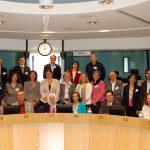

As it has been stated by the UN Department of Economic and Social Affairs, “the twentieth anniversary of the International Year of the Family offers an opportunity to refocus on the role of families in devel-opment; take stock of recent trends in family policy development; share good practices in family policy making; review challenges faced by families worldwide and recommend solutions.”
In response to this and other relevant General Assembly and Economic and Social Council resolutions, the Doha Inter-national Institute for Family Studies and Development and the International Federation for Family Development, together with the United Nations Focal Point on the Family, have organized several events in Brussels hosted by the EU Committee of the Regions.
A Raise Awareness Meeting was held on the 5th June, with the participation of speakers from the European Parliament, the European Commission and the OECD, among others.
The Meeting gathered members of the European Parliament, EU officers, representatives of the civil society and other stakeholders interested in family issues.
H. E. Noor Al-Maki, Executive Director of the Doha International Institute for Family Studies and Development, stressed in her welcoming speech the need for “more explicit policies to address the challenges facing families today” because “individuals do not live in vacuum, they live in families” and invited all governments and civil society to “take the opportunity provided by the Celebration of the Anniversary of the International Year of the Family to call on governments to take concrete measures to strengthen the family institution and to improve the wellbeing of families through implementing effective national polices, strategies and programs. “
The other welcoming speech was delivered by the president of the International Federation for Family Development, Mrs. Marina Robben, who remembered the mandate of their last Congress of this Federation, which emphasized that “educational campaigns should be carried out in Member States in order to enable parents to carry out their role as the first and foremost educators of their children,” and added her conviction that “this is the best issue in which we can invest our efforts for a better future.”
The ‘hidden discrimination’
The event was hosted by the Committee of Regions, represented by Mr. Thomas Wobben, Director of the Directorate for horizontal policies, who mentioned how family is both being affected by the economic crisis and acting as a refuge for it in different countries of the European Union. “We can see how, when different Member States are coping with the crisis, in many of them families play a key role to be the foundation to keep the society together.”
Mrs. Anna Záborská, Chairwoman of the Working Group on the Family in the European Parliament, made the opening speech, in which she mentioned the “hidden discrimination that fathers and mothers are exposed to” when their contribution to the public wealth is not acknowledged, and the need to include the care for the aged as part of the intergenerational dialogue and solidarity. “Women and mothers are the first ones to invest in that solidarity that builds the social body,” she added.
A round table followed, with three speakers. In the first place, Mrs. Renata Kaczmarska, the United Nations Focal Point on the Family, explained the general framework of the International Year of the Family observances and recalled the Programme of Action of the World Summit for Social Development regarding families, which includes “encouraging social and economic policies that are designed to meet the needs of families and their individual members, especially the most disadvantaged and vulnerable members, with particular attention to the care of children, ensuring opportunities for family members to understand and meet their social responsibilities, promoting mutual respect, tolerance and cooperation within the family and within society, and equal partnership between women and men in the family.”
Dominic Richardson, Policy Analyst of the OECD Social Policy Division, spoke about ‘Poverty and policy for families in Europe’. According to his words, the main goals for family policies should be “promoting choice for parents in reconciling work and family life, enabling people to have children at the time of their choice, mobilising hitherto unused labour supply, enhancing gender equity, reducing family poverty and enhancing child development.”
Mrs. Barbara Trentin, from the Regional Minister of Social Affairs in the Veneto Region, explained some projects from the regional point of view, including “cash and in kind legal support to enterprises willing to provide independent programs for conciliation between family and professional life, intervention services for children and flexible care arrangements for disabled people.”
To achieve ‘ambitious goals’
After the round table, Mrs. Lieve Fransen, EU Director Responsible for Europe 2020: Social Policies, made the final speech on ‘Family-oriented strategies for ensuring work-family balance’.
She also pointed out that the ambitious goals for the next years will need a lot of effort and persistence on Member States and other stakeholders, mainly with women and young people.
Video
Audios
– Statement by Mrs. Noor Al-Malki (original EN).
– Statement by Mrs. Noor Al-Malki (interpretation FR).
– Statement by Mrs. Marina Robben (original EN).
– Statement by Mrs. Marina Robben (interpretation FR).
– Speech by Mr. Thomas Wobben (original EN).
– Speech by Mr. Thomas Wobben (interpretation FR).
– Speech by Mrs. Anna Záborská (original FR).
– Speech by Mrs. Anna Záborská (interpretation EN).
– Presentation by Mrs. Renata Kaczmarska (original EN).
– Presentation by Mrs. Renata Kaczmarska (interpretation FR)
– Presentation by Mr. Dominic Richardson (original EN).
– Presentation by Mr. Dominic Ricardson (interpretation FR).
– Presentation by Mrs. Barbara Trentin (original FR).
– Presentation by Mrs. Barbara Trentin (interpretation EN).
– Presentation by Mrs. Lieve Fransen (original EN).
– Presentation by Mrs. Lieve Fransen (interpretation FR).






